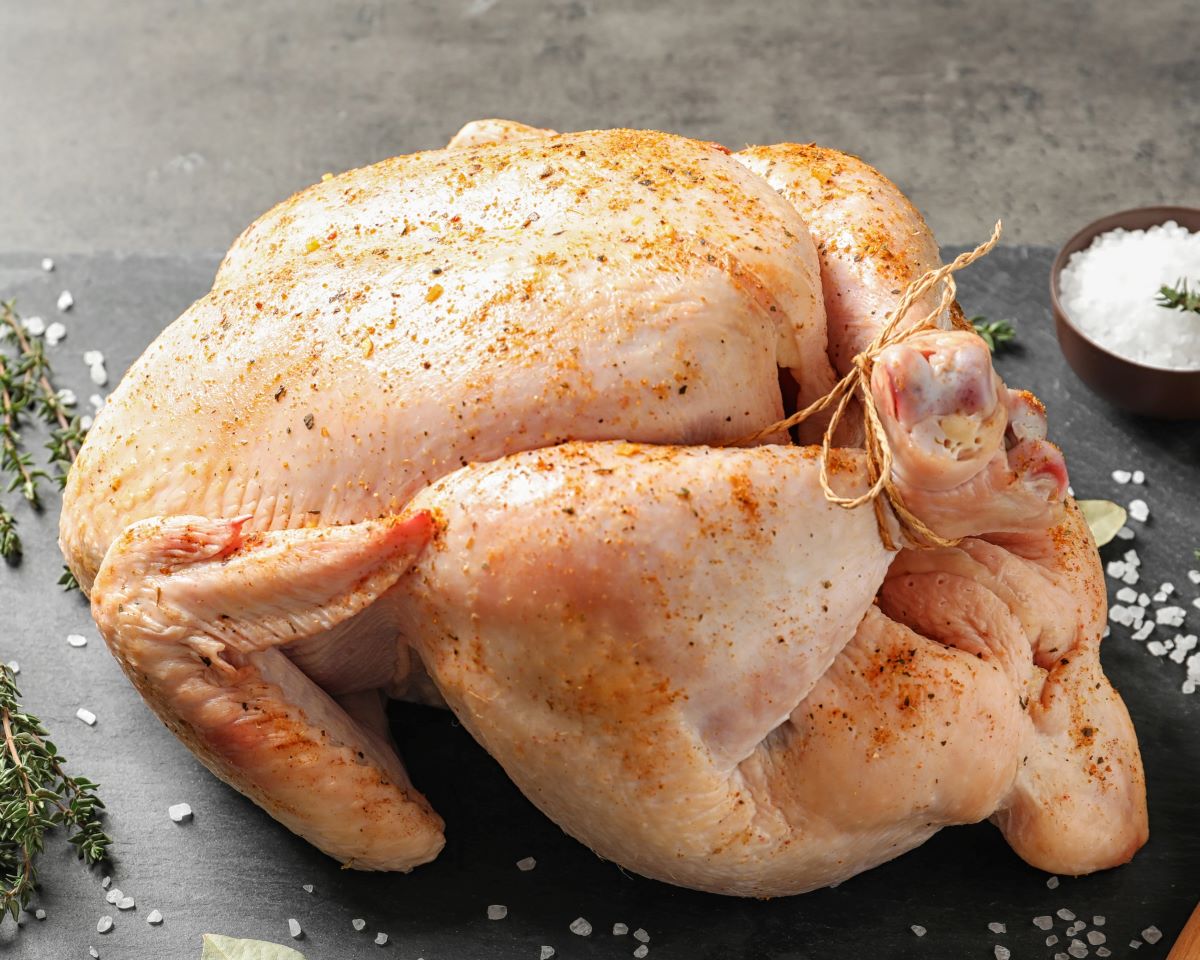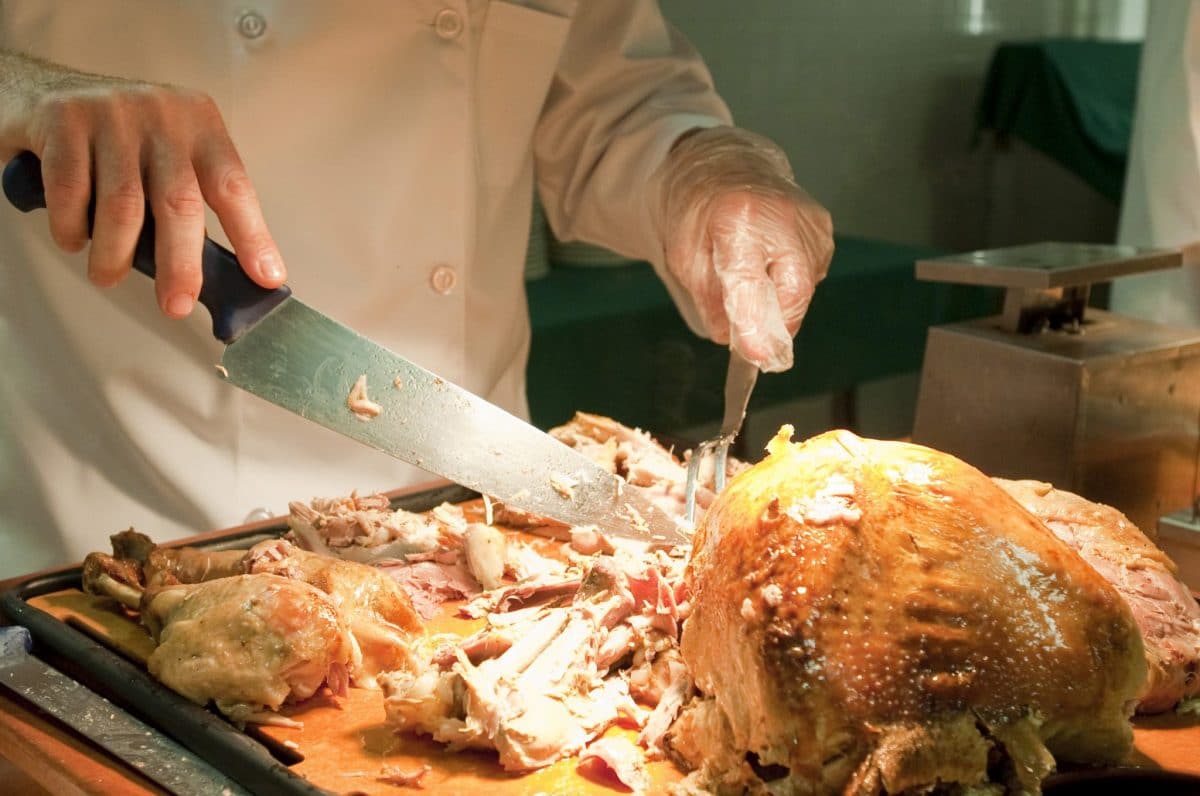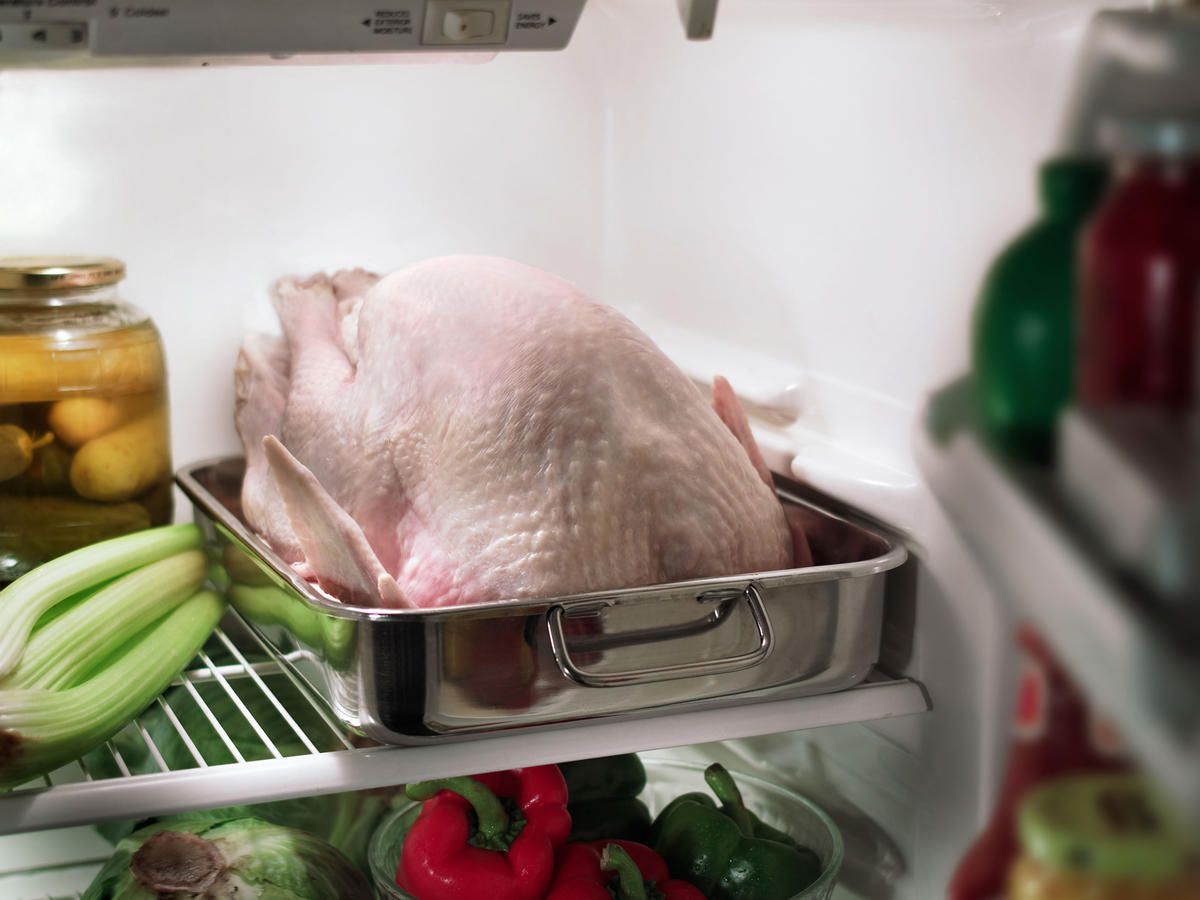

Articles
How To Store Fresh Turkey
Modified: February 24, 2024
Learn how to properly store fresh turkey to keep it safe and flavorful. Read our informative articles on turkey storage techniques and tips.
(Many of the links in this article redirect to a specific reviewed product. Your purchase of these products through affiliate links helps to generate commission for Storables.com, at no extra cost. Learn more)
Introduction
Storing fresh turkey properly is essential to maintain its quality and prevent the growth of harmful bacteria. Whether you have leftover turkey from a holiday feast or you want to preserve fresh turkey for future meals, following the correct storage procedures is crucial. By understanding the factors to consider and adopting the right techniques, you can ensure that your fresh turkey remains safe to eat and retains its flavor and texture.
In this article, we will explore the various factors to consider before storing fresh turkey, the optimal storage temperature, step-by-step instructions on how to store it, and essential tips for preserving its freshness. Whether you are a seasoned cook or a novice in the kitchen, this guide will provide you with valuable information to extend the shelf life of your fresh turkey.
Key Takeaways:
- Proper storage of fresh turkey is essential to maintain its quality and prevent bacterial growth. Consider factors like freshness, size, and packaging, and store at temperatures below 40°F for optimal preservation.
- Use airtight packaging, label and date the turkey, and practice good hygiene when handling and storing it. Thaw frozen turkey in the refrigerator and monitor storage temperature regularly for safe and flavorful consumption.
Read more: How To Store Turkey
Factors to Consider Before Storing Fresh Turkey
Before you store your fresh turkey, there are several important factors to consider to ensure its safety and quality. By taking these factors into account, you can make informed decisions and avoid potential issues with your stored turkey.
- Freshness: It is crucial to start with a fresh turkey. Check the packaging for the expiration date and choose a turkey with the latest date possible. If purchasing from a butcher, ensure that the turkey is freshly slaughtered and has been stored at the appropriate temperature.
- Size: The size of the turkey affects the storage time. Smaller turkeys generally have a longer shelf life compared to larger ones. Consider the number of people you need to serve and choose a turkey size accordingly.
- Packaging: Ensure that the turkey is tightly sealed in its original packaging or transfer it to an airtight container or resealable bag. Proper packaging helps prevent contamination and keeps the turkey moist.
- Stuffing: If your turkey comes with stuffing inside, it is recommended to remove the stuffing before storing. Stuffing can become a breeding ground for bacteria and may not retain its texture and flavor when stored with the turkey.
- Brining: If you have brined the turkey, make sure to drain and pat it dry before storing. Excess moisture can lead to bacterial growth and affect the texture of the meat.
- Preparation: If you have already cooked the turkey, it is essential to store the leftovers promptly. Allow the turkey to cool down before storing to avoid the risk of bacterial growth.
By considering these factors, you can ensure that your fresh turkey is in the best condition for storage and maintain its quality for an extended period.
Proper Storage Temperature for Fresh Turkey
The proper storage temperature is crucial to maintain the freshness and safety of your fresh turkey. Keeping the turkey at the optimal temperature helps to prevent bacterial growth and avoid spoilage. The recommended storage temperature for fresh turkey is below 40°F (4°C). It is important to note that the turkey should be stored at a temperature that is cooler than room temperature to ensure its longevity.
There are several options for maintaining the proper storage temperature:
- Refrigerator: The refrigerator is the most common and convenient option for storing fresh turkey. Place the turkey on a tray or in a shallow pan to catch any drippings, and keep it on the bottom shelf where the temperature is the most consistent. Make sure the refrigerator temperature is set to below 40°F (4°C) and avoid overcrowding to allow for proper air circulation.
- Cooler with Ice Packs: If you don’t have enough space in your refrigerator, you can use a cooler with ice packs to store the turkey. Fill the cooler with ice packs and place the turkey on top, making sure it is well wrapped and insulated. Remember to replenish the ice packs regularly to maintain the proper temperature.
- Freezer: If you want to store the fresh turkey for an extended period, you can freeze it. Wrap the turkey tightly in freezer-safe bags or aluminum foil to prevent freezer burn. It is recommended to store the turkey in portions for easier thawing and usage. Ensure the freezer temperature is set to 0°F (-18°C) or below for optimal preservation.
Regardless of the storage method you choose, it is crucial to monitor the temperature regularly to ensure it remains within the recommended range. Investing in a refrigerator thermometer or using a digital thermometer can help you keep track of the temperature accurately.
Remember, the storage temperature plays a significant role in maintaining the quality and safety of your fresh turkey, so it is important to follow these guidelines for the best results.
Steps to Store Fresh Turkey
Storing fresh turkey properly requires a few simple steps to ensure its longevity and quality. By following these steps, you can safely store your fresh turkey and maintain its flavor and texture.
- Prepare the turkey: If you haven’t already, remove any packaging, labels, and giblets from the turkey. Rinse the turkey under cold water and pat it dry with paper towels.
- Package the turkey: Place the turkey in an airtight container or resealable bag. Alternatively, you can wrap it tightly in aluminum foil or plastic wrap. Make sure the packaging is secure to prevent air and moisture from entering, which can lead to spoilage.
- Label and date: Write the date of storage on the packaging to keep track of its freshness. Additionally, label it with the contents if you have multiple packages in the freezer or refrigerator.
- Choose the storage method: Decide whether you will store the turkey in the refrigerator or freezer based on your intended length of storage. If you plan to use it within a few days, store it in the refrigerator. For longer storage, freezing is recommended.
- Refrigerator storage: Place the packaged turkey on a tray or in a shallow pan to catch any juices that may leak. Position it on the bottom shelf of the refrigerator to maintain a consistent temperature.
- Freezer storage: If you are freezing the turkey, make sure it is tightly wrapped to prevent freezer burn. Place it in the freezer in a flat position to maximize space. If you have multiple packages, consider stacking them neatly, leaving enough space for proper air circulation.
- Monitor the temperature: Regularly check the storage temperature to ensure it remains below 40°F (4°C) for refrigeration or 0°F (-18°C) for freezing. Use a thermometer to accurately measure the temperature.
Following these steps will help you store your fresh turkey safely and maintain its quality for an extended period. Remember to always practice good hygiene and safe food handling when storing and preparing your turkey to minimize the risk of contamination.
Store fresh turkey in the coldest part of the refrigerator, ideally below 40°F. Keep it in its original packaging or a shallow dish to catch any drips, and use within 1-2 days of purchase.
Tips for Preserving Fresh Turkey
Preserving the freshness of your fresh turkey is essential to ensure its quality and flavor when you’re ready to use it. Here are some helpful tips to help you preserve your fresh turkey:
- Use airtight packaging: Whether storing the turkey in the refrigerator or freezer, it’s important to use airtight packaging to prevent air and moisture from entering. This helps to maintain the turkey’s texture and flavor while preventing freezer burn.
- Date and label: Always label the packaging with the date of storage to keep track of its freshness. Additionally, label it with the weight and any special marinades or seasonings used, if applicable.
- Divide into portions: If you have a large fresh turkey, consider dividing it into smaller portions for easier handling and thawing. This allows you to only thaw the amount you need, reducing waste and preserving the quality of the remaining portions.
- Properly thaw before use: If you store the turkey in the freezer, ensure you allow enough time to properly thaw it before use. The safest way to thaw a turkey is to do so in the refrigerator, allowing approximately 24 hours of thawing time for every 4-5 pounds (1.8-2.3 kg) of turkey.
- Keep storage area clean: Maintain cleanliness in your storage area, whether it’s a refrigerator, a freezer, or a cooler. Regularly clean and sanitize the storage space to prevent the buildup of bacteria, ensuring the turkey stays safe to consume.
- Optimal storage duration: Fresh turkey can be stored in the refrigerator for up to 4 days. If you need to store it for a longer period, freezing is the best option. Frozen turkey can be stored for several months, but for the best flavor and quality, it is recommended to consume it within 6-9 months.
- Thawed turkey storage: If you’ve thawed the turkey but don’t plan to cook it immediately, it’s important to use it within 1-2 days. Do not re-freeze a previously thawed turkey, as this can affect its texture and safety.
By following these tips, you can ensure that your fresh turkey stays fresh, flavorful, and safe to consume for an extended period. Proper storage techniques and attention to hygiene are key to preserving the quality of your turkey until you’re ready to enjoy it.
Read more: How To Store Ground Turkey
Frequently Asked Questions (FAQs) about Storing Fresh Turkey
Here are some commonly asked questions about storing fresh turkey, along with their answers:
- Can I store fresh turkey at room temperature?
- How long can I store fresh turkey in the refrigerator?
- What is the best way to thaw a frozen turkey?
- Can I refreeze a previously thawed turkey?
- How long can I store fresh turkey in the freezer?
- Can I store leftover cooked turkey?
- Is it safe to eat turkey that has been stored past its expiration date?
No, storing fresh turkey at room temperature is not safe. The temperature danger zone for food is between 40°F (4°C) and 140°F (60°C), where bacteria can grow rapidly. It is important to store your fresh turkey in the refrigerator or freezer to maintain its freshness and prevent bacterial growth.
Fresh turkey can be stored in the refrigerator for up to 4 days. Make sure to keep it at a temperature below 40°F (4°C) to prevent bacterial growth. It’s important to consume or freeze the turkey within this timeframe to ensure its safety and quality.
The safest way to thaw a frozen turkey is to do so in the refrigerator. Allow approximately 24 hours of thawing time for every 4-5 pounds (1.8-2.3 kg) of turkey. Place the turkey on a tray or in a shallow pan to catch any drippings. It is not recommended to thaw a turkey at room temperature, as it can promote bacterial growth.
No, it is not recommended to refreeze a previously thawed turkey. Once the turkey has been thawed, it should be cooked or used within 1-2 days. Refreezing can affect the texture and safety of the meat.
Fresh turkey can be stored in the freezer for several months. However, for the best quality and flavor, it is recommended to consume it within 6-9 months. Ensure that the turkey is properly wrapped and sealed to prevent freezer burn.
Yes, leftover cooked turkey can be stored in the refrigerator. Place it in an airtight container or resealable bag and consume it within 3-4 days. If you want to store it for longer, freezing is a better option.
No, it is not recommended to consume turkey that has exceeded its expiration date. The expiration date is an indication of the freshness and safety of the product. Consuming expired turkey can put you at risk of foodborne illnesses.
If you have any more questions or concerns about storing fresh turkey, it is best to consult with a food safety expert or refer to the guidelines provided by your local health authority.
Conclusion
Properly storing fresh turkey is crucial to maintain its quality, prevent bacterial growth, and ensure its safety for consumption. By considering factors such as freshness, size, packaging, and preparation, you can make informed decisions about storing your turkey. The recommended storage temperature for fresh turkey is below 40°F (4°C), whether it is stored in the refrigerator or freezer. Following the step-by-step instructions for storing the turkey and implementing essential tips for preservation will help extend its shelf life.
Remember to use airtight packaging, label and date the turkey, and practice good hygiene when handling and storing it. Thawing frozen turkey in the refrigerator is the safest method, and using divided portions can help with flexibility in usage. It is important to monitor the storage temperature regularly and adhere to the recommended storage times to maintain the freshness and safety of the turkey.
By following these guidelines and tips, you can safely store your fresh turkey and enjoy it at its best when you’re ready to use it. Good storage practices not only ensure the quality of your turkey but also prevent food waste and save you money. So, whether you have leftover turkey from a holiday feast or you’re planning to store fresh turkey for future meals, proper storage techniques will help you make the most out of this delicious and versatile protein.
Now that you have the knowledge about storing fresh turkey, you can confidently preserve its freshness and enjoy its delightful taste even days after it has been cooked. Happy storing and savoring!
Frequently Asked Questions about How To Store Fresh Turkey
Was this page helpful?
At Storables.com, we guarantee accurate and reliable information. Our content, validated by Expert Board Contributors, is crafted following stringent Editorial Policies. We're committed to providing you with well-researched, expert-backed insights for all your informational needs.















0 thoughts on “How To Store Fresh Turkey”